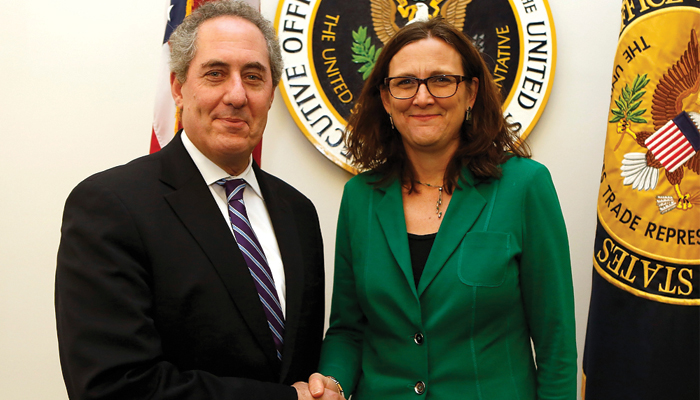 www.ustr.gov
www.ustr.gov
The Strategic Push For Trade
After their meeting at the White House on Monday, President Obama and German Chancellor Angela Merkel called for “meaningful progress” in the negotiations for the Transatlantic Trade and Investment Partnership (TTIP) in 2015.
Both leaders reaffirmed their support for the transatlantic free trade agreement, urging negotiators to work towards an agreement that “boosts our economies with strong protections for consumers and workers and the environment.”
Merkel emphasized Germany’s willingness to reach an agreement, stating that the country will “come out forcefully in seeing that the negotiations between the EU and the United States on free trade agreements are pursued in a vigorous manner.”
Their remarks came just days after the eigth round of negotiations between the European Commission and of the office of the United States Trade Representative (USTR) for TTIP were concluded in Brussels. This round marked the first negotiating milestone during the tenure of the EU’s recently appointed new Trade Commissioner, Cecilia Malmström.

U.S. Trade Representative Froman and European Commissioner for Trade Malmstrom (www.ustr.gov)
Since her debut in November 2014, Malmström has been fighting criticism over a supposed lack of transparency in the negotiations and the contents of the Investor-State Dispute Settlement (ISDS) with new transparency measures and more public consultations on ISDS.
With the start of the new EU Juncker Commission and US trade agenda gaining steam after the midterm elections, both Malmström and her American counterpart Ambassador Michael Froman have called for a “fresh start” in the negotiations.
This latest round seems to have yielded some concrete results, as negotiators are ramping up their efforts to get as much of the technical work done as possible in 2015, aiming for two more additional rounds before the summer starts. EU Chief Negotiator Ignacio Garcia Barcero highlighted the progress that has been made in the area of transatlantic regulatory cooperation, particularly around the issues of food safety and animal and plant health.
Improved regulatory cooperation can go a long way in making it easier for businesses to export their products across the Atlantic. As part of the EU’s strive towards maximizing transparency in these negotiations, their proposals which were tabled last week in the area of regulatory cooperation have been published.
Speaking at the Second Annual EU-US Trade Summit in Brussels last Thursday, the US ambassador to the EU Anthony Gardner rebuffed some of the criticism that was raised in Europe concerning TTIP. He urged critics to reflect on the potential consequences if the U.S. and the EU fail to set the trade agenda themselves, “we have a window of opportunity during the next few years to set a standard for future regional and global trade deals that reflect our shared support for rules-based trade, high standards and regulatory transparency and accountability. If we fail, other countries who do not share our values and whose weight in the international tradition system is growing fast will set the agenda themselves.”
Gardner’s comments are consistent with the broader strategic framework that the US is pursuing in relation to international trade. On February 6th, the White House released its National Security Strategy for 2015, in which obtaining Trade Promotion Authority (TPA) from the Congress was a top priority.
TPA will give the administration more leeway to successfully conclude negotiations for the Trans-Pacific Partnership (TPP) as well as TTIP. Advancing the trade agenda, as the document outlines, “brings job to our shores, increases standards of living, strengthens our partners and allies, and promotes stability in critical regions.”






[…] For more information on the geopolitical importance of trade, please see: ‘The Strategic Push for Trade’ […]
[…] The Strategic Push for Trade […]